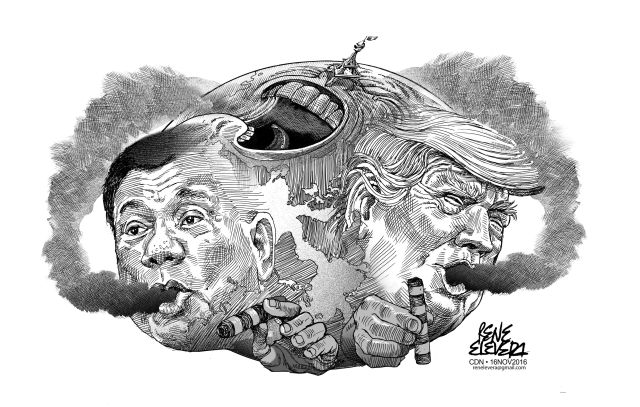
November is said to be the Environmental Awareness Month, and it is no small coincidence that it was also three years ago on this month — Nov. 8 to be exact — when Super Typhoon Yolanda gave flesh to the meaning of the phrase the “new normal” in association with global climate change.
Yolanda earned its super typhoon status as it devastated parts of Central Visayas and claimed thousands of lives, as it became the strongest typhoon in recorded Philippine history and set the unenviable bar against which other typhoons will be compared to.
Yolanda is but one of many examples of global climate change that, if left unchecked, will cause more super typhoons, each one worse than before.
That’s the impetus for the Paris accord of 2015 which sought global action on reducing carbon emissions for the next several years in order to save the planet.
Among the major signatories was the US that saw a seismic shift in their political landscape with the election of businessman and climate change skeptic Donald Trump as its 45th president.
Aside from his surprise victory, Trump is also raising an uproar over his rumored appointment of Myron Ebell, whom ecology groups labeled as one of “seven of the most wanted environmental criminals” in the world “for destroying the future.”
An article by the New York Times outlines Ebell’s resume, whose group the Competitive Enterprise Institute is financed by the coal industry. He is an opponent of the Clean Power Plan of the Environmental Protection Agency (EPA), an agency he is rumored to be appointed to by Trump once he takes office.
Any change in course for the US on its environmental policies will likely affect the Paris accord on climate change by influencing other signatories, including the Philippines, to also cancel their commitments.
President Rodrigo Duterte had been quoted as saying that he will not honor the Paris accord because his administration is prioritizing the country’s economic growth through industrialization which may entail creating industries that can aggravate the worsening global carbon footprint.
Is it coincidence then that his administration is also following in the footsteps of President-elect Trump who had committed to Americans to adopt an “America First” policy that will lean heavily on pollution-inducing industrialization instead of creating clean energy sources for future generations?
In that respect, at least both men are similar. While the US and Philippine governments wrestle with ways on how to prop up their flagging economies, ecology advocates and watchers will have their work cut out for them in lobbying for more eco-friendly energy and economic policies.
Disclaimer: The comments uploaded on this site do not necessarily represent or reflect the views of management and owner of Cebudailynews. We reserve the right to exclude comments that we deem to be inconsistent with our editorial standards.




